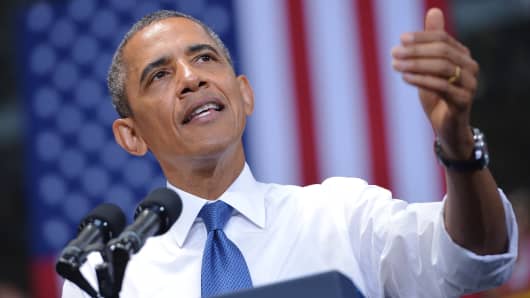Recapping the day's news and newsmakers through the lens of CNBC.
Notes:
President Obama wants corporate tax reform and job creation. OK, but when all is said and done, will this make corporate taxes higher or lower?
For business executives, that's the bottom-line question in President Obama's new "Grand Bargain" that would pay for roads and other infrastructure spending with a business tax overhaul.
Many details are yet to come, but the plan would, on the one hand, cut the top corporate tax rate to 28 percent from 35, while on the other it would change depreciation schedules and impose a minimum tax on foreign earnings. Taxes on manufacturers would be capped at 25 percent.
Just how much new revenue this would raise is not yet clear, but Obama had earlier proposed $50 billion in infrastructure spending focused on projects intended to create jobs.
The strategy, outlined in a speech to be given today at an Amazon.com facility in Chattanooga, Tenn., is to break congressional gridlock by coupling corporate tax reform Republicans want with infrastructure spending desired by Democrats. In addition to roads and bridges, the money would be used to improve community colleges and promote manufacturing.
Skeptics say proposals sketched out by Obama in recent day are sketchy, that the government's ability to create jobs is limited and that foreign earnings repatriation often fails to raise significant tax revenue.
Quotes:
"As part of his efforts to focus Washington on the middle class, today in Tennessee the president will call on Washington to work on a grand bargain focused on middle-class jobs by pairing reform of the business tax code with a significant investment in middle-class jobs."—Obama senior advisor Dan Pfeiffer
"I think the most important point here with respect to the corporate tax rate, or at least in the context of this discussion—the tax repatriation push—is that you're really talking about a very small group of companies."—Dan Greenhaus, BTIG chief global investment strategist


